Sacred Stories, a stained glass coloring book is now available on Amazon! Proceeds to benefit Episcopal Charities. https://www.amazon.com/dp/1960505866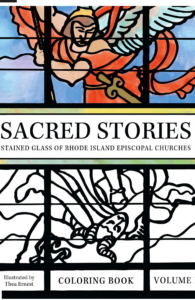
ECC’s City Camp Enriches Summer
 For nearly 40 years, children from the Olneyville section of Providence have had the opportunity to spend part of their summer at ECC’s City Camp, a free day camp for children ages 6 to 12 that includes both field trips and the games, fun, and relationship-building of more traditional summer camps.
For nearly 40 years, children from the Olneyville section of Providence have had the opportunity to spend part of their summer at ECC’s City Camp, a free day camp for children ages 6 to 12 that includes both field trips and the games, fun, and relationship-building of more traditional summer camps.
Marisa Rainey first came to City Camp in 2011 as a counselor. “City Camp made me want to be a teacher,” she says. After several years of serving as the program’s director in the summertime as director of City Camp and teaching middle school math in Roxbury, Massachusetts during the school year, Rainey is now ECC’s full-time summer camp and program director.
“I knew I wanted to work with kids, but I didn’t know how,” she says. “That summer, I was the only female counselor, so I had all the girls. I was surprised by how much I enjoyed the 11- and 12-year-olds talking about their lives and families and school, but disheartened by how little they liked math. I wrote my college admissions essay about that and became a middle school math teacher. Except for the summer after college when I worked for Teach for America, I’ve been at City Camp ever since.”
“Service to the community is a pillar of ECC, as is the belief that every child deserves chance to go to camp,” Rainey says. “As an educator, I know that kids fall behind without camp and the activities and connections it offers.” City Camp, she has been delighted to find, runs in families, and she now meets younger siblings and family members of previous generations of campers participating in the program.
While City Camp offers children exposure to activities they might not otherwise experience, Rainey says that counselors benefit as much as campers. City Camp “is not about us giving an experience to others. It’s about all of us having an experience together.”
Although City Camp 2023 lasted just two weeks due to a staffing shortage, Rainey hopes to return soon to the camp’s typical six-week program. To support the program, ECC accepts donations of water bottles, healthy snacks, and other items on their wish list. Granola bars and other breakfast items are particularly helpful, because while Rhode Island’s Summer Food Service Program covers lunch for each camper, its hours of operation do not qualify it to receive breakfast funds.
Congregations interested in supporting the program or hosting a lunch in 2024 can email Rainey at Marisa@episcopalri.org.
Marking History at Trinity Church, Newport
Bishop Knisely and the Rev. Canon Timothy J. Watt, rector of Trinity Church, Newport, led a service of word and song to mark the dedication of a slave history medallion at the church on Sunday, October 30 at 4 p. m.
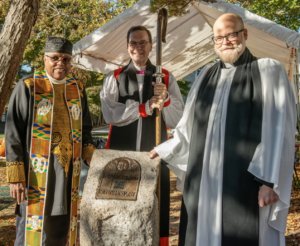 The medallion was installed by the Rhode Island Slave History Medallion (RISHM) project, a statewide effort to promote public awareness of the history of slavery and the slave trade across the state. Trinity is now one of a growing number of sites at which a QR-coded bronze plaque, called a medallion, opens a web page on visitors’ mobile phones explaining the site’s connection to the history of slavery in Rhode Island.
The medallion was installed by the Rhode Island Slave History Medallion (RISHM) project, a statewide effort to promote public awareness of the history of slavery and the slave trade across the state. Trinity is now one of a growing number of sites at which a QR-coded bronze plaque, called a medallion, opens a web page on visitors’ mobile phones explaining the site’s connection to the history of slavery in Rhode Island.
“It’s hard to imagine any industry, any institution, in this state that was here in the early 19th century that in some way was not participating in and receiving monies that were connected with the trade of human beings, both in the United States and in the Caribbean, from insurance industries to loom and textile manufacturers to the church” Bishop Knisely said. “We are all connected to that story. And it is a hard story to hear.
“Sometimes it is hard to face the truth,” he said, “but there is no other way to be free.”
Canon Watt said since Trinity’s vestry approved the placement of the medallion, he had heard from critics who said it went too far and those who said it did not go far enough in acknowledging the church’s participation in the slave trade. But he said it was “a simple historical fact” that Trinity parishioners and several of its early rectors enslaved people or were involved in the trans-Atlantic trade in human beings.
In October 1729, George Berkeley, the eminent philosopher, preached from Trinity’s pulpit in support of the “Yorke-Talbot Opinion,” a joint opinion of the British attorney and solicitor generals that enslaved persons did not become free by virtue of their baptism.
“In other words, ‘Relax, masters, it’s okay to let them be baptized. They’ll still be your slaves,’” Watt said.
Berkeley, who was then a priest and later a bishop in the Church of Ireland, enslaved several people at his nearby farm in Middletown during his few years in Rhode Island. The opinion he defended helped legitimized slavery in Great Britain for decades.
As a Christian, Watt said, he prays that Jesus will correct him when he is in error and bring him to amendment of life. “And so, we place this marker to remember when we’re in error and for the Holy Spirit to work in us for amendment of life,” he said.
Charles Roberts, RIHSM’s director, told those gathered for the dedication that his organization places medallions at historic sites to make the history of the state’s involvement in the transatlantic slave trade more accessible to the general public. On occasion, he said, people discover they have a personal connection to this history, as had happened to him.
As a child growing up in Newport, Roberts played in the nearby God’s Little Acre colonial graveyard and was taken with the two-shouldered gravestones adorned with an angel’s face that made him feel as though he were playing in “a sea of angels.” There are similar gravestones in Trinity’s own cemetery, he said.
As an adult, he learned that a stone in this style marked the grave of Cuffe Gibbs, who had been enslaved by George Gibbs and later by his son, both of whom were members of Trinity Church. The stone had been carved and signed by Gibbs’ brother, Pompe Stevens, who was enslaved by a local artisan. In signing this one example of his work, Stevens caused later historians to look upon the contributions of black artisans to colonial era culture with fresh eyes, and also gave evidence that the ties of a Black family had endured despite its members enslavement in different households. Stevens’ design is the inspiration for the design of the medallions place by RIHSM.
“This is living history,” Roberts said. “It doesn’t go away. We are in it. we are part of it.”
The service concluded with a vibrant choral performance by RPM (Reaching People Through Music) Voices of Rhode Island.
Raise Together
Our Episcopal Conference Center is in the midst of a capital campaign to fund much needed repairs to the barn, and other improvements. There is information on the ECC website: eccri.org. Please watch this video, and consider how you can help. Thank you.
Raise Together: ECC Capital Campaign 2021 from Breaking Branches Pictures on Vimeo.
Center for Reconciliation News
The Center for Reconciliation, a ministry of the Episcopal Diocese of Rhode Island, is pleased to announce the appointment of Marco A. McWilliams as Associate Director of Education and Training.
McWilliams is an educator and public scholar of African-American history. He is a Mississippi born activist, educator, and is the founding organizer and former deputy director of the Providence Africana Reading Collective (PARC). Marco is also a founding director of the Black Studies program at DARE, and an organizer with Behind the Walls, DARE’s prison abolition committee. He is the founder of the Providence Black Studies Freedom School, a free political education project focused on providing theoretically grounded and engaged historical instruction for members of Providence’s diverse communities.
Marco is a Program Associate at the Swearer Center where he has served as a Junior Fellow and Practitioner-in-Residence since 2017. He also has a background in community organizing, anti-racism training and workshop facilitation. Currently a core faculty member at College Unbound, he is a member of the Mayor’s African-American Ambassador’s Group, and is a Mayoral appointee to the Special Committee for the Review of Commemorative Works in Providence.
Marco is a graduate of Rhode Island College where he majored in African Studies, and is a Master’s Degree candidate at Brown University, in the Department of American Studies. His field of study is African-American History, mid -19th & 20th Century Black Radical Organizing Traditions. Marco brings his strong background in training and education and a true passion for the work of the Center.
ECC Community Spotlight
Dr. Robert Power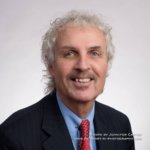
Newport School Committee
2013 – 2015
“My time at ECC certainly impacted my work in schools and on the School Committee. When I went to camp I learned about what it really meant to be in Christian community – more than just church on Sunday. I learned that how you treat people matters, and how important it was to make sure that everyone was doing ok. If my camper was having a good time, I was having a good time.
I took that mentality into my work in schools with my work on the School Committee and in my role as Superintendent or Assistant Superintendent. I wanted to give everyone the chance to succeed, even if people thought they couldn’t do it. It was also important to me to be able to work well with lots of different people to find common ground so we could get things done.
Now that I’m retired, I’m spending my time raising money for public schools so they have endowments for technology.”
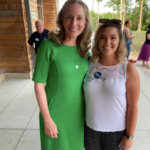
Jasmine Smith
Finance Coordinator at Spanberger for Congress
Virginia 2020
“Last campaign cycle, I worked on a local House of Delegates race for Juanita Jo Matkins as an an intern and was promoted to the position of finance director. After working full time as the finance director and going to school full time simultaneously, I said “I am never working on another campaign unless it’s for Abigail Spanberger.”
I’ve always admired Abigail from the first day I researched her. She first started her career in law enforcement, working in narcotics and money laundering cases for the US Postal Inspection Service. Abigail then moved on to serve her country in the CIA as a case officer, and after running for Congress, she made history with being the first Democrat elected to her seat since 1968 and the first woman to ever serve this district. And right now, I’m sitting in our office, writing this blurb after ending our last fundraising quarter last night. Sometimes I can’t believe it.
I was a very shy child, I didn’t speak unless spoken to. ECC has given me the ability to thrive and speak my mind in any situation, because of camp’s acceptance of anyone from any background. Camp has given me so many useful tools that I use every single day in my life. The most important & impactful, is the meaning of hard work. Work projects at camp are what make camp well… Camp! Cutting down trees, painting cabins, and cleaning all make camp the place we all know and love; and when you see your hard work after a work project, it’s a reminder of a job well done. While we do not have the results of the elections, working hard on Abigail’s campaign and seeing her work in Congress for her constituents and the nation is, in a way, like a work project.
If you work really hard, you get to see the amazing end result. The result in this case being, a Congresswoman that works hard for the American people. Abigail is the 5th most bipartisan House member, and works hard with people from across the aisle to deliver real legislation that helps everyone, regardless of their political affiliation. I am so thankful, and so grateful, to work for someone like her.
So, thank you ECC. Thank you for accepting me for who I am and helping me become the person I am today. I will be eternally grateful for the experience I had at ECC, because it gave me the tools I need to help re-elect my Congresswoman and my role model.”
Heather Matson
State Representative of Iowa House District 38
Elected in 2018
“From 1983-1994, I spent part or all of my summers at ECC as a camper and then as a counselor. There are countless ways ECC impacted my life, not the least of which are lifelong friendships. When I reflect on my time at camp and how it informed my life, I always come back to the idea that no matter what, you pitched in.
It never occurred to me that attending “work camp” might be unusual because why wouldn’t I want to clear brush and paint cabins if I was doing it with my friends? We were taught how to get the job done and how to share our gifts with each other, and part of the fun was always a sense of accomplishment. I think most counselors learn how to be leaders at camp, but the extra special thing about ECC is that my experience also taught me how to be vulnerable in the best sense of the word; that I could try something new or put my ideas out into the group without judgement. I believe that leadership – especially political negotiating – requires a hint of vulnerability to put yourself out on the line to get big things done. There was, and still is, a feeling of a greater good at ECC, of finding ways to make our corner of the world a little bit of a better place than we found it. To me, that’s the essence of public service and it’s what I try to accomplish in my community and as a legislator.”
 Emily Harrison
Emily Harrison
Volunteer Poll Worker
Lincoln, RI 2020
Spoiler: Emily is not an alumni. In fact, she is isn’t quite yet voting age either. She IS, however, pre-registered and able to provide us with a great example of how to get involved and take action, beyond just casting your ballot.
“After attending this sacred and unusual summer camp my whole life, it took me the longest time to figure out why I kept wanting to come back (not just because every single person in my family goes religiously – pun intended). I couldn’t place why it was so special to me, but I knew I shouldn’t take the time spent on that property for granted. I can look back and see that because I was being loved and supported by the ECC community, it gave me permission to put in the work to really find myself.
My major interest in public service, or just helping people in general, came from my participation in City Camp Woonsocket and Bridge Camp. There’s something about serving others that I can’t really put into words, but I know it makes me happy to be able to help other people enjoy a camp experience. Seeing the positive impact that you can have on someone’s life, no matter how small, is something I hold very dear. These moments of impact from my time at camp have been the key inspiration that led me to want to work at the polls. Helping to make the experience of a voter a little bit more positive, can be my way of bringing the same love and support that camp showed me, out into the world.
Thanks to ECC, I know my time at the polls this year will be the first of many!”
Megan Birch-McMichael
Elected to Board of Selectman
Stow, MA 2020
“It’s actually hard to put into words how being at ECC impacted my desire to get involved in public service. For me, as for many, ECC was a completely formative experience. I started attending at 12 years old, as a Junior Work camp camper (begrudgingly at first…what 12 year old is excited about going to a camp where you also have to like, clear a path or scrape and paint buildings?) While my friends were spending endless days at the beach, I was getting eaten alive by mosquitoes and having to go to church twice a day.
But that’s the strange and magical thing about ECC, really. The impact that one week of work camp had on the rest of my life is immeasurable. I kept coming back to camp and then eventually became a counselor and young adult staff. From there, I spent a year working at City Year in Providence and as a young adult volunteered for anything and everything that I could in my spare time. I worked for a non-profit in DC for close to a decade, where I met my husband and had two children.
After I became a parent, and we moved to MA, I got involved with the food pantry in our town as well as the PTO at my children’s school. I live in a small town, and when there was an opportunity to get involved with our local Planning Board, I volunteered to step in. I spent 2 years as an associate member and then, with the support of lots of people in my town, I decided to run for the Select Board and was elected to a three year term in June 2020. For those of you not in MA, the Select Board is a group of 5 elected individuals who serve as the policy making body in town; it’s sort of like a city council in RI.
Service to one’s community is ingrained so deeply inside of myself, when I thought about why I do what I do, it really all comes down to my time spent at ECC. It’s the tenet of “Love your neighbor” that is a guiding principle.”
In addition to her civic work, Megan is a published writer. Read her article published in the New York Times this week here: https://www.nytimes.com/…/family/foster-parents.html…
Response from the Center for Reconciliation
Charities NOW

Many have asked in this time of pandemic, “What can I do? How can I love my neighbor when I can’t leave my home?” We know you want to make a difference and want to help your neighbor in need, but Covid-19 has thwarted your power.
Here’s your answer. Episcopal Charities announces the debut of “Charities NOW”. “Charities NOW” collects donations from you, our donors, and immediately turns them around to aid those ministries and agencies on the front-lines assisting our at-risk elders and at-risk children. This departure from our grant program allows us to distribute funds right away. We have identified those who are working tirelessly to bring food, shelter, medicine, and other basic human needs to our brothers and sisters, but they need our help Now. (Click here to see a list of agencies we have helped) 100% of your donation goes to this effort. No administration fees are deducted.
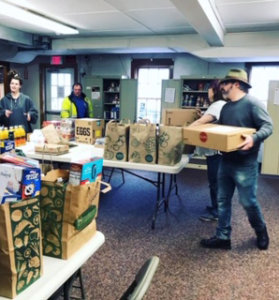
So, how do you donate? It’s easy. Click on the button below, enter your credit card and donation on the “Charities NOW” line. To make a contribution by check, make it payable to Episcopal Charities of Rhode Island, 275 North Main Street, Providence, RI. 02903. On the memo line of your check, please write “NOW”. That’s it!
And, you don’t have to leave the house! Hurry, they need us. They need you!
You Did It!
Because of YOU, Episcopal Charities met its 2019 goal! Thirty ministries and agencies in Rhode Island working with our churches benefited from your gift of love to provide for the basic human needs of at-risk children and elders. YOUR donation provides food, shelter and healthcare for those who would otherwise go without.

Well Done and THANK YOU!
Province I Coordinator
Province I of The Episcopal Church, comprised of the Episcopal dioceses in New England –Vermont, New Hampshire, Maine, Massachusetts, Western Massachusetts, Rhode Island and Connecticut – is seeking a half-time Province I Coordinator. The primary role of the Coordinator is to assist Episcopalians in the dioceses of New England to network with one another around shared interests and activities in service to the mission of God. As such, the Coordinator serves as a principal resource for groups and individuals who seek to partner with one another around common goals and activities. The Coordinator is not called to initiate activities and programs, but rather to respond to emerging needs and activities arising from the various networks across the Episcopal Church in New England.

